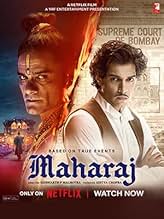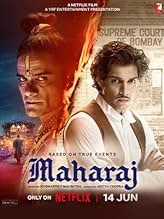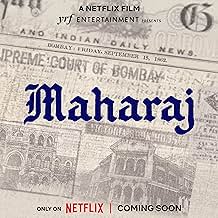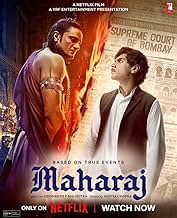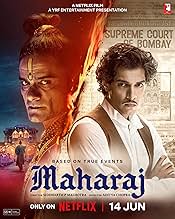ÉVALUATION IMDb
6,5/10
15 k
MA NOTE
Ajouter une intrigue dans votre langueBased on a real-life historic court case, a bold journalist questions a revered leader's immoral behavior.Based on a real-life historic court case, a bold journalist questions a revered leader's immoral behavior.Based on a real-life historic court case, a bold journalist questions a revered leader's immoral behavior.
- Director
- Writers
- Stars
- Prix
- 11 victoires et 28 nominations au total
Sommaire
Reviewers say 'Maharaj' is a historical drama tackling blind faith and social reform, lauded for its narrative and performances. Junaid Khan's debut and Jaideep Ahlawat's antagonist role are highlighted, though opinions on Khan's performance differ. The film's production, cinematography, and historical context are praised, yet some criticize the screenplay and pacing. It's seen as a resonant, thought-provoking piece on truth and justice.
Avis en vedette
"Maharaj," directed by Siddarth P. Anand, is a compelling historical drama that revisits the landmark Maharaj Libel Case of 1862. With an engrossing storyline, powerful performances, and meticulous attention to historical detail, the film offers a vivid portrayal of a pivotal moment in Indian legal history and society.
Plot Summary The film centers on the Maharaj Libel Case, a significant legal battle in Bombay during the British Raj. The case involves a young journalist, played by Junaid Khan, who exposes the immoral activities of a powerful religious leader from the Vaishnav sect, portrayed by Jaideep Ahlawat. The resulting defamation lawsuit becomes a landmark case, highlighting the clash between truth and power, and the fight for justice and moral integrity.
Acting Performances Junaid Khan delivers a breakout performance as the courageous journalist. His portrayal of a principled young man standing up against corruption and hypocrisy is both compelling and inspiring. Khan's nuanced acting captures the internal struggles and resilience of his character, making his journey profoundly relatable.
Jaideep Ahlawat is equally formidable as the antagonist. His depiction of the charismatic yet morally corrupt Maharaj is chilling. Ahlawat's ability to convey the complexities of a powerful figure facing public scrutiny adds significant depth to the narrative. His performance ensures that the character is not just a one-dimensional villain, but a person with his own vulnerabilities and manipulations.
Direction and Cinematography Siddarth P. Anand's direction is masterful, showcasing his talent for creating a rich, immersive historical setting. His eye for detail is evident in the meticulous recreation of 1860s Bombay, bringing to life the bustling streets, colonial architecture, and socio-political atmosphere of the era. Anand's ability to balance the dramatic courtroom scenes with the broader social context of the time is commendable, making the narrative both gripping and educational.
Historical and Cultural Context The film delves deep into the Vaishnav sect, exploring its beliefs, practices, and the influence of its leaders during the British Raj. Anand presents a balanced view of the sect, highlighting its spiritual significance while also critiquing the corruption that can arise within any institution. This contextual richness adds layers to the story, making it not just a legal drama, but a commentary on the complexities of faith and power.
Set Design and Production Values The set design in "Maharaj" is outstanding, capturing the essence of 19th-century Bombay with impressive authenticity. The attention to detail in the costumes, props, and settings creates a visually captivating experience. The production team's dedication to historical accuracy extends to every aspect of the film, from the grand courtrooms to the modest homes and bustling marketplaces. This meticulous craftsmanship immerses the audience in the period, enhancing the storytelling.
Conclusion "Maharaj" is a powerful and thought-provoking film that excels in both storytelling and historical representation. The performances of Junaid Khan and Jaideep Ahlawat are stellar, bringing depth and intensity to their characters. Siddarth P. Anand's direction ensures that the film is not only a compelling legal drama but also a rich historical tapestry that sheds light on an important chapter in Indian history.
With its engaging narrative, strong performances, and impeccable production values, "Maharaj" stands out as a significant contribution to contemporary Indian cinema. It is a film that challenges, inspires, and transports the audience to a crucial moment in time, reminding us of the enduring struggle for truth and justice.
Plot Summary The film centers on the Maharaj Libel Case, a significant legal battle in Bombay during the British Raj. The case involves a young journalist, played by Junaid Khan, who exposes the immoral activities of a powerful religious leader from the Vaishnav sect, portrayed by Jaideep Ahlawat. The resulting defamation lawsuit becomes a landmark case, highlighting the clash between truth and power, and the fight for justice and moral integrity.
Acting Performances Junaid Khan delivers a breakout performance as the courageous journalist. His portrayal of a principled young man standing up against corruption and hypocrisy is both compelling and inspiring. Khan's nuanced acting captures the internal struggles and resilience of his character, making his journey profoundly relatable.
Jaideep Ahlawat is equally formidable as the antagonist. His depiction of the charismatic yet morally corrupt Maharaj is chilling. Ahlawat's ability to convey the complexities of a powerful figure facing public scrutiny adds significant depth to the narrative. His performance ensures that the character is not just a one-dimensional villain, but a person with his own vulnerabilities and manipulations.
Direction and Cinematography Siddarth P. Anand's direction is masterful, showcasing his talent for creating a rich, immersive historical setting. His eye for detail is evident in the meticulous recreation of 1860s Bombay, bringing to life the bustling streets, colonial architecture, and socio-political atmosphere of the era. Anand's ability to balance the dramatic courtroom scenes with the broader social context of the time is commendable, making the narrative both gripping and educational.
Historical and Cultural Context The film delves deep into the Vaishnav sect, exploring its beliefs, practices, and the influence of its leaders during the British Raj. Anand presents a balanced view of the sect, highlighting its spiritual significance while also critiquing the corruption that can arise within any institution. This contextual richness adds layers to the story, making it not just a legal drama, but a commentary on the complexities of faith and power.
Set Design and Production Values The set design in "Maharaj" is outstanding, capturing the essence of 19th-century Bombay with impressive authenticity. The attention to detail in the costumes, props, and settings creates a visually captivating experience. The production team's dedication to historical accuracy extends to every aspect of the film, from the grand courtrooms to the modest homes and bustling marketplaces. This meticulous craftsmanship immerses the audience in the period, enhancing the storytelling.
Conclusion "Maharaj" is a powerful and thought-provoking film that excels in both storytelling and historical representation. The performances of Junaid Khan and Jaideep Ahlawat are stellar, bringing depth and intensity to their characters. Siddarth P. Anand's direction ensures that the film is not only a compelling legal drama but also a rich historical tapestry that sheds light on an important chapter in Indian history.
With its engaging narrative, strong performances, and impeccable production values, "Maharaj" stands out as a significant contribution to contemporary Indian cinema. It is a film that challenges, inspires, and transports the audience to a crucial moment in time, reminding us of the enduring struggle for truth and justice.
Any who crosses the dignity n sanctity of Vedic injunctions for ulterior selfish motives misusing n misguiding needs to be taught a lesson. That's the theme of the movie. Story revolves around a true historical court case of 1862 in Bombay portraying the fight between a self claimed saint n a social reformer. A socially highly relevant film with an amazing sets, cast n execution. Storytelling has been powerful. Definitely worth a watch. Available on Netflix. My ratings 7/10!
Any who crosses the dignity n sanctity of Vedic injunctions for ulterior selfish motives misusing n misguiding needs to be taught a lesson. That's the theme of the movie. Story revolves around a true historical court case of 1862 in Bombay portraying the fight between a self claimed saint n a social reformer. A socially highly relevant film with an amazing sets, cast n execution. Storytelling has been powerful. Definitely worth a watch. Available on Netflix. My ratings 7/10!
Any who crosses the dignity n sanctity of Vedic injunctions for ulterior selfish motives misusing n misguiding needs to be taught a lesson. That's the theme of the movie. Story revolves around a true historical court case of 1862 in Bombay portraying the fight between a self claimed saint n a social reformer. A socially highly relevant film with an amazing sets, cast n execution. Storytelling has been powerful. Definitely worth a watch. Available on Netflix. My ratings 7/10!
I wasn't expecting much from the movie but thought of giving it a watch and honestly it ended up exceeding my expectations. From the cinematography to the dialogues everything was exceptional. Also I found junaid khan's performance so natural and impressive since this was his debut movie and he absolutely nailed it!! Hope that he gets to play more amazing roles in future as he seems like the only nepo kid who's trying to make his name by his hard work and not through PR. Sharvari was a treat to watch as well.
This movie not only shows the illicit acts that people used to practice under the guise of religion but also highlights the issues women face to this day. Recommended!
This movie not only shows the illicit acts that people used to practice under the guise of religion but also highlights the issues women face to this day. Recommended!
The film was suddenly shown without any marketing for it, just some news about the participation of Junaid Khan, son of the star Aamir Khan, in the film, in addition to the battle between the film makers and the courts.
The film, from my point of view, is a Bollywood film with all the elements of enjoyable home viewing, but I was I hope that the film tends to narrate history and events in more depth, without songs, performances, and melodramatic dialogues.
The scenery and sets, the costumes and music, the cinematography and the direction, are all good factors in this film.
The acting is very good and a successful start for Junaid Khan, and I hope to see his upcoming works. The film is worth watching, but I expected it to be stronger than what I saw.
The film, from my point of view, is a Bollywood film with all the elements of enjoyable home viewing, but I was I hope that the film tends to narrate history and events in more depth, without songs, performances, and melodramatic dialogues.
The scenery and sets, the costumes and music, the cinematography and the direction, are all good factors in this film.
The acting is very good and a successful start for Junaid Khan, and I hope to see his upcoming works. The film is worth watching, but I expected it to be stronger than what I saw.
After a court case and a string of controversies, the movie dropped on Netflix with minimal promotion. It is a story inspired by true incidents and a case that was widely discussed.
Based on the 2013 Gujarati novel by Saurabh Shah, Karan P. Malhotra's film presents a dramatized account of the landmark 1862 Maharaj libel case. Maharaj filed a defamation case against social reformer and journalist Karsandas Mulji, who exposed his sexual predations disguised as acts of faith.
The story could have been written better. Nevertheless, it keeps you engrossed throughout the narrative. It sets the premise, establishes the characters, and helps you understand the public's blind faith in a godman. The courtroom drama should have been exciting and nail-biting, but with excessive cinematic liberties, it feels highly unrealistic, and the climax takes away the punch it could have delivered.
Set in 1960, the production value is top-notch, making the story highly believable. However, the movie lacks the emotional depth it was supposed to create, failing to make you root for any character. The songs are average and forgettable.
Junaid Khan, son of Aamir Khan, debuts with this movie and was the worst choice for such a strong character. He maintains a single expression throughout the film. On the other hand, Jaideep Ahlawat as Maharaj steals the show. His acting prowess and physical transformation are remarkable, and his calm demeanor makes him both menacing and evil. Shalini Pandey is decent, and surprisingly, Sharvari Wagh, a recent favorite of YRF, has done well, nailing the Gujarati accent.
The film had so much potential with a better screenplay and a stronger lead, but the opportunity is lost. Watch it to learn about the real-life heroes of our country; otherwise, it is just a half-baked work. #pranureviews #Maharaj #MaharajReview.
Based on the 2013 Gujarati novel by Saurabh Shah, Karan P. Malhotra's film presents a dramatized account of the landmark 1862 Maharaj libel case. Maharaj filed a defamation case against social reformer and journalist Karsandas Mulji, who exposed his sexual predations disguised as acts of faith.
The story could have been written better. Nevertheless, it keeps you engrossed throughout the narrative. It sets the premise, establishes the characters, and helps you understand the public's blind faith in a godman. The courtroom drama should have been exciting and nail-biting, but with excessive cinematic liberties, it feels highly unrealistic, and the climax takes away the punch it could have delivered.
Set in 1960, the production value is top-notch, making the story highly believable. However, the movie lacks the emotional depth it was supposed to create, failing to make you root for any character. The songs are average and forgettable.
Junaid Khan, son of Aamir Khan, debuts with this movie and was the worst choice for such a strong character. He maintains a single expression throughout the film. On the other hand, Jaideep Ahlawat as Maharaj steals the show. His acting prowess and physical transformation are remarkable, and his calm demeanor makes him both menacing and evil. Shalini Pandey is decent, and surprisingly, Sharvari Wagh, a recent favorite of YRF, has done well, nailing the Gujarati accent.
The film had so much potential with a better screenplay and a stronger lead, but the opportunity is lost. Watch it to learn about the real-life heroes of our country; otherwise, it is just a half-baked work. #pranureviews #Maharaj #MaharajReview.
Le saviez-vous
- AnecdotesDebut of Junaid Khan.
Meilleurs choix
Connectez-vous pour évaluer et surveiller les recommandations personnalisées
- How long is Maharaj?Propulsé par Alexa
Détails
- Durée2 heures 11 minutes
- Couleur
- Mixage
Contribuer à cette page
Suggérer une modification ou ajouter du contenu manquant


